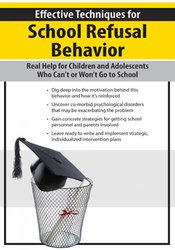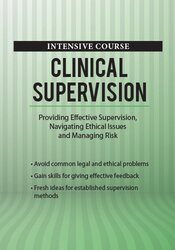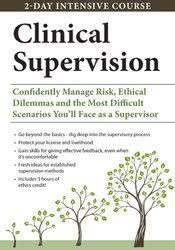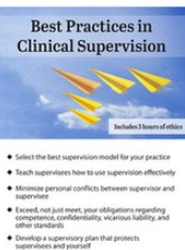🌟 New Year Offer 🌟
Celebrate 2026 with 30% OFF on all products! Use code: NEWYEAR2026. Hurry, offer ends soon!
School refusal behavior is often associated with co-morbid disorders such as anxiety or depression and has far-reaching and long-term consequences.
George Haarman – Effective Techniques for School Refusal Behavior

Truants or Refusers
The importance of Assessing WHY They Aren’t in School
- The dynamic difference between school refusers and truants
- Common characteristics of school refusers
- Completing a functional analysis of school refusers
- Categorical-dimensional approach
- Reinforcement contingencies
- Co-morbid DSM-5® disorders
- Anxiety disorders
- Oppositional Defiant Disorder
- PostTraumatic Stress Disorder
- Depressive disorders
- Phobias
- Conduct disorders
- Learning disorders
- Factors to consider when assessing for school refusal
- Standardized assessment measures to employ
- Critical questions to ask refusers and their parents
Strategic Interventions that Get Refusers Back in School, and Keep Them There
- Factors that increase the likelihood of success
- Individual intervention/therapy
- Systematic Desensitization
- Exposure therapy
- Modeling
- Cognitive therapy
- Educational/supportive therapy
- Family intervention/therapy
- Parent training
- Structured family therapy
- Systemic family therapy
- Dialectical Behavior Therapy-School Refusal
- Pharmacological intervention
- Tricyclics
- SSRI’s
- Beta Blockers
- Benzodiazepines
- Interventions for refusers seeking to:
- Avoid negative effect
- Escape from aversive social and evaluative aspects of school
- Get attention
- Receive tangible reinforcers
- Craft an individualized intervention plan
- “School Makes Me Want to Throw Up”
- “Everybody There Hates Me”
- “Can’t I Stay at Home and Have You Teach Me?”
- “The School of Hard Knocks”
Getting School Personnel and Parents Involved
- Forced school attendance
- Using school escorts
- 35 concrete tips for parents
- Suggestions for teachers and school counselors
Would you like to receive George Haarman – Effective Techniques for School Refusal Behavior ?
Description:
“I don’t want to go to school!” Who hasn’t heard that phrase before? While we may chuckle remembering the lengths we might have taken to avoid school, there are many children and adolescents whose struggles with school are much deeper and demand more urgent attention. They are exhibiting school refusal behavior, and their actions signal that something is very wrong.
School refusal behavior is often associated with co-morbid disorders such as anxiety or depression and has far-reaching and long-term consequences. School refusersmay have serious problems with nightmares, temper outbursts, poor academic performance, stunted social skill development, and even physical ailments.
In this unique slant on an often-misunderstood phenomenon, Dr. George Haarman will show you how to simultaneously address two competing demands when treating school refusal— immediately meeting attendance expectations set by the schools while also digging deeperto uncover and treat underlying problems.
You will be able to more quickly differentiate school refusal from common phobic reactions by recognizing and addressing the presence of anxiety, depressive, and other disorders that may be co-morbid or causing school refusal. Armed with a better understanding of the particular motivation and reinforcement systems related to the school refusal behavior, you can then offer strategic, individualized intervention plans that have a much greater chance of success.
Here’s What You’ll Get in George Haarman – Effective Techniques for School Refusal Behavior

Course Features
- Lecture 1
- Quiz 0
- Duration Lifetime access
- Skill level All levels
- Language English
- Students 0
- Assessments Yes
- 1 Section
- 1 Lesson
- Lifetime
- Purchased: George Haarman - Effective Techniques for School Refusal Behavior1



